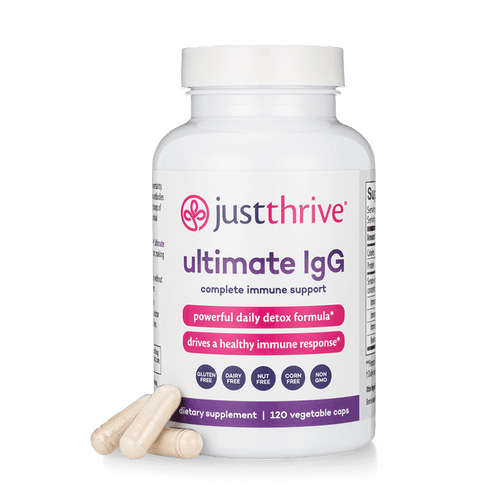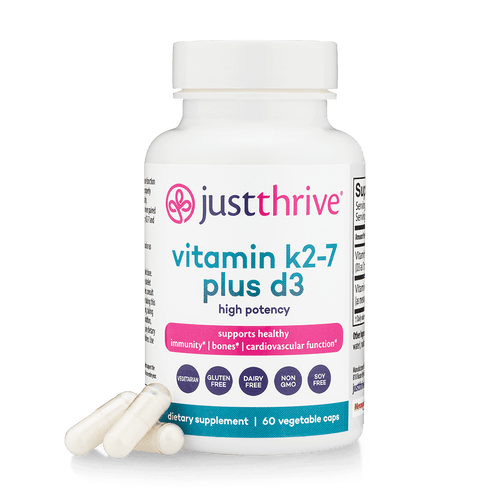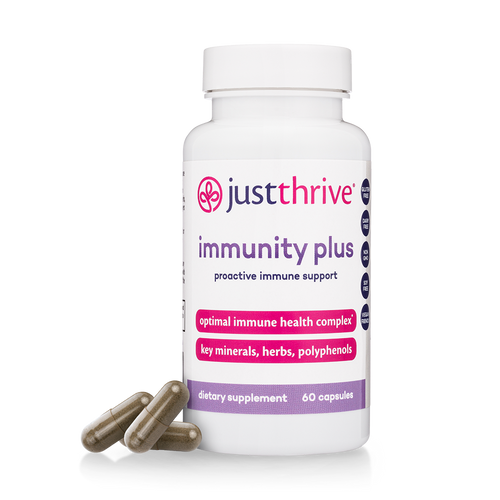Plus, the two game-changing vitamins you’re probably deficient in.
When it comes to lifespan, the U.S. ranks 34th. We’re behind Switzerland, Korea, Australia, Canada, and Chile, among many others.[1]
And it gets worse. Currently at 76.4 years, the average American lifespan is the lowest it’s been in nearly 20 years, and it seems to be shrinking every year.[2] That’s despite our extremely high healthcare spending—nearly twice as much as Germany, which has the next highest spending.
So why are Americans dying younger? There are lots of reasons. Some, like what you eat, you can control. Others, like your genes and family history, you can’t.
To live a long and healthy life—because longer isn’t better if you’re not well—you have to take proactive steps. Read on to find out how you can increase your overall wellness, your vitality, and your longevity…no matter how the average U.S. lifespan looks.
5 Ways to Prolong Your Life and Your Health
You can still be active and vital well into your 90’s, maybe even 100’s…with a sharp mind, strong bones, and vital energy…
Here are 5 things you can do to promote a longer, healthier, more vibrant life so you can enjoy every year you have.

1. Eat well.
The standard American diet is full of fat, sugar, and processed foods that promote systemic inflammation, obesity, type 2 diabetes, chronic disease, and premature death.[3]
On the flip side, diets rich in nutrient-dense and fiber-rich foods have the opposite effect: reducing the risk of premature death from all causes.[4]
Research shows that switching to a diet that includes fruits and vegetables, nuts, legumes, fish, and lean meats can add years to your life expectancy…no matter how old you are.[5]
2. Keep moving.
It doesn’t take athlete-level training or practically living at the gym to keep you alive and well. But it does take daily activity and physical movement.
Unfortunately, in the U.S. being sedentary has become a way of life. Research shows that even moderate activity like walking can do the trick. Just 150 minutes of walking each week—just a little over 20 minutes a day—can reduce the risk of premature death by up to 29%.[6]
3. Manage stress.
You can’t avoid stressors; they surround you every day. But you can change how your body manages stress, and that change can be life-saving.
Studies show that chronic stress increases your risk of death from all causes.[7] Plus, chronic stress puts you at risk for many debilitating diseases such as cancer, heart attack, dementia, and depression.[8]
Stress-reducing techniques like meditation, mindfulness, yoga, and deep breathing can help you handle stressors more effectively, preventing stress from shaving years off your life.
4. Sleep well.
Frequent insomnia and sleep interruptions take a huge toll on your mind, body, and health. It can also reduce your disease-free years by increasing your risk of cardiovascular disease and other severe health issues.[9] Research shows that sleeping well can add up to 20.4 disease-free years to your life.[10]

5. Prioritize longevity nutrients.
Vitamin K2 and vitamin D3 are two of the important nutrients for healthy longevity… but most people don’t get nearly enough of them. Those deficiencies can make you vulnerable to disease and reduced life expectancy. So, it’s important to make sure you’re getting enough of both.
So what do these natural powerhouses do for you?
Vitamin D3
The sunshine vitamin is essential for life and health, but nearly a billion people worldwide are deficient and nearly half the population has vitamin D insufficiency.[11] Low levels of vitamin D have been linked to:[12,13,14]
- cancer
- respiratory diseases
- frequent or recurring infections
- premature aging
- cardiovascular disease
- dementia
- obesity
- rheumatoid arthritis
- metabolic syndrome
It’s tough to get enough sun year-round to keep your vitamin D levels in a healthy range, especially without risking sunburn and skin cancer. Not only that, it’s virtually impossible to get enough of this nutrient from diet alone. Research shows that supplementing with 5000 IU of vitamin D3—the most beneficial form—can help you stay healthy.[15]
Vitamin K2
Vitamin K2 performs dozens of critical functions that keep you alive and well… but you’re probably not getting enough of it either. One study found that 97% of participants had insufficient levels![16] And low levels of vitamin K2 can lead to more serious problems such as:[17]
- osteoporosis
- bone fractures
- atherosclerosis
- heart attack
- stroke
- cancer
- premature aging
Low levels of vitamin K2 also increase the risk of premature death.[18,19]>
Unfortunately, just as with vitamin D3, it’s difficult to get enough vitamin K2 through diet alone. That’s why supplementing with vitamin K2 is the best way to make sure you have plentiful supplies of this vital nutrient.
Look for supplements containing vitamin K2-7, the most absorbable, bioavailable form of this essential nutrient to get the most out of it.
Support Your Longevity With Vitamin K2-7 Plus D3
Vitamins K2 and D3 are essential for supporting your immune system, heart and bone health, and overall healthy longevity. It’s important to get sufficient levels of these crucial nutrients, but most people don’t.
Just Thrive Vitamin K2-7 Plus D3 contains high potency forms of both vitamins: 200 mcg of K2-7 and 5000 IU of D3.
Add Vitamin K2-7 Plus D3 into your daily routine to make sure you’re getting enough of these two important nutrients every day.
>> Take control of your health and longevity with Vitamin K2-7 Plus D3.
Thinking about trying Just Thrive Vitamin K2-7 Plus D3 but not sure if it’s right for you?
We can help ease your mind. We’re confident that when you take Vitamin K2-7 Plus D3 as directed, you’ll reap the multitude of benefits these vitamins deliver.
But if you aren’t completely happy, tell us. Every Just Thrive purchase comes with a Bottom of the Bottle, 100% money back guarantee. If you’re not satisfied with your purchase for any reason, you can request a full product refund at any time. Even if it’s been 3 days… 3 weeks… or 3 months. Even if the bottle is empty!
Sources
- National Research Council (US) Panel on Understanding Divergent Trends in Longevity in High-Income Countries; Crimmins EM, Preston SH, Cohen B, editors. Explaining Divergent Levels of Longevity in High-Income Countries. Washington (DC): National Academies Press (US); 2011. 1, Difference Between Life Expectancy in the United States and Other High-Income Countries. Available from: https://www.ncbi.nlm.nih.gov/books/NBK62373/
- Centers for Disease Control and Prevention (CDC). Life Expectancy in the U.S. Dropped for the Second Year in a Row in 2021. August 31, 2022. Available from: https://www.cdc.gov/nchs/pressroom/nchs_press_releases/2022/20220831.htm
- Institute of Medicine (US) Committee on Examination of Front-of-Package Nutrition Rating Systems and Symbols; Wartella EA, Lichtenstein AH, Boon CS, editors. Front-of-Package Nutrition Rating Systems and Symbols: Phase I Report. Washington (DC): National Academies Press (US); 2010. 4, Overview of Health and Diet in America. Available from: https://www.ncbi.nlm.nih.gov/books/NBK209844/
- English LK, Ard JD, Bailey RL, Bates M, Bazzano LA, Boushey CJ, Brown C, Butera G, Callahan EH, de Jesus J, Mattes RD, Mayer-Davis EJ, Novotny R, Obbagy JE, Rahavi EB, Sabate J, Snetselaar LG, Stoody EE, Van Horn LV, Venkatramanan S, Heymsfield SB. Evaluation of Dietary Patterns and All-Cause Mortality: A Systematic Review. JAMA Netw Open. 2021 Aug 2;4(8):e2122277. doi: 10.1001/jamanetworkopen.2021.22277. PMID: 34463743; PMCID: PMC8408672.
- Fadnes LT, Økland JM, Haaland ØA, Johansson KA. Estimating impact of food choices on life expectancy: A modeling study. PLoS Med. 2022 Feb 8;19(3):e1003962. doi: 10.1371/journal.pmed.1003962.
- Lee DH, Rezende LFM, Joh HK, Keum N, Ferrari G, Rey-Lopez JP, Rimm EB, Tabung FK, Giovannucci EL. Long-Term Leisure-Time Physical Activity Intensity and All-Cause and Cause-Specific Mortality: A Prospective Cohort of US Adults. Circulation. 2022 Aug 16;146(7):523-534. doi: 10.1161/CIRCULATIONAHA.121.058162. PMID: 35876019; PMCID: PMC9378548.
- Tian F, Shen Q, Hu Y, Ye W, Valdimarsdóttir UA, Song H, Fang F. Association of stress-related disorders with subsequent risk of all-cause and cause-specific mortality: A population-based and sibling-controlled cohort study. Lancet Reg Health Eur. 2022 May 28;18:100402. doi: 10.1016/j.lanepe.2022.100402. PMID: 35663363; PMCID: PMC9160321.
- Mariotti A. The effects of chronic stress on health: new insights into the molecular mechanisms of brain-body communication. Future Sci OA. 2015 Nov 1;1(3):FSO23. doi: 10.4155/fso.15.21. PMID: 28031896; PMCID: PMC5137920.
- Huang BH, Del Pozo Cruz B, Teixeira-Pinto A, Cistulli PA, Stamatakis E. Influence of poor sleep on cardiovascular disease-free life expectancy: a multi-resource-based population cohort study. BMC Med. 2023 Mar 2;21(1):75. doi: 10.1186/s12916-023-02732-x. PMID: 36859313; PMCID: PMC9979412.
- Stenholm S, Head J, Kivimäki M, Magnusson Hanson LL, Pentti J, Rod NH, Clark AJ, Oksanen T, Westerlund H, Vahtera J. Sleep Duration and Sleep Disturbances as Predictors of Healthy and Chronic Disease-Free Life Expectancy Between Ages 50 and 75: A Pooled Analysis of Three Cohorts. J Gerontol A Biol Sci Med Sci. 2019 Jan 16;74(2):204-210. doi: 10.1093/gerona/gly016. PMID: 29415200.
- Sizar O, Khare S, Goyal A, et al. Vitamin D Deficiency. [Updated 2023 Jul 17]. In: StatPearls [Internet]. Treasure Island (FL): StatPearls Publishing; 2023 Jan. Available from: https://www.ncbi.nlm.nih.gov/books/NBK532266/
- Heath AK, Kim IY, Hodge AM, English DR, Muller DC. Vitamin D Status and Mortality: A Systematic Review of Observational Studies. Int J Environ Res Public Health. 2019 Jan 29;16(3):383. doi: 10.3390/ijerph16030383.
- Vetter VM, Sommerer Y, Kalies CH, Spira D, Bertram L, Demuth I. Vitamin D supplementation is associated with slower epigenetic aging. Geroscience. 2022 Jun;44(3):1847-1859. doi: 10.1007/s11357-022-00561-8.
- Álvarez-Mercado AI, Mesa MD, Gil Á. Vitamin D: Role in chronic and acute diseases. Encyclopedia of Human Nutrition. 2023;535-544. doi:10.1016/B978-0-12-821848-8.00101-3
- van Helmond N, Brobyn TL, LaRiccia PJ, Cafaro T, Hunter K, Roy S, Bandomer B, Ng KQ, Goldstein H, Mitrev LV, Tsai A, Thwing D, Maag MA, Chung MK. Vitamin D3 Supplementation at 5000 IU Daily for the Prevention of Influenza-like Illness in Healthcare Workers: A Pragmatic Randomized Clinical Trial. Nutrients. 2022 Dec 30;15(1):180. doi: 10.3390/nu15010180. PMID: 36615837; PMCID: PMC9823308.
- Bruno EJ. The Prevalence of Vitamin K Deficiency/Insufficiency, and Recommendations for Increased Intake. J Hum Nutr Food Sci. 2016;4(1):1077.
- Simes DC, Viegas CSB, Araújo N, Marreiros C. Vitamin K as a Powerful Micronutrient in Aging and Age-Related Diseases: Pros and Cons from Clinical Studies. Int J Mol Sci. 2019 Aug 25;20(17):4150.
- Juanola-Falgarona M, et al. Dietary intake of vitamin K is inversely associated with mortality risk. J Nutr. 2014 May;144(5):743-50.
- Berenjian A, Sarabadani Z. How menaquinone-7 deficiency influences mortality and morbidity among COVID-19 patients. Biocatal Agric Biotechnol. 2020 Oct;29:101792. doi: 10.1016/j.bcab.2020.101792. Epub 2020 Sep 16. PMID: 32952745; PMCID: PMC7492799.














